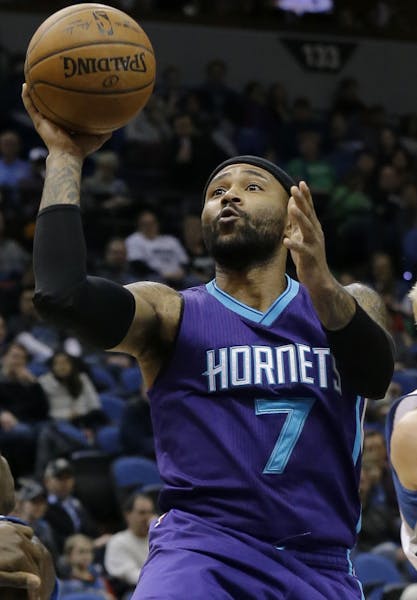Sounding as tired as his team looked at times Sunday night, Timberwolves coach Flip Saunders sat down after a 109-98 loss to the Charlotte Hornets at Target Center and laid out the facts.
Too many injuries, too many minutes for young players, too many problems as a result.
"Guys, we're tired," Saunders said. "I wish I could tell you we have 19-year-old-guys used to playing lots of minutes. What happens is, you get tired and you lose some of your concentration.''
With seemingly as many players healthy as hurt, the Wolves started fast, operated efficiently and led considerably before, collectively, running into a wall.
The Wolves shot the ball at a 55.4 percent clip. They built a 13-point lead with less than two minutes left in the first half. And then, over about the next 10 minutes of game time, that all changed.
A 24-6 run that ended the first half and began the second was enough to give the Hornets (30-38) a five-point lead on Gerald Henderson's 20-foot jumper with 8 minutes, 17 seconds left in the third quarter. Charlotte, still battling for a playoff spot in the Eastern Conference, never trailed again.
The Wolves continued to shoot the ball well, but the deadly combination of turnovers (10 over the final two-plus quarters) and problems rebounding (Charlotte had a 17-5 edge on second-chance points) was too much to overcome.
Indeed, the loss added yet another statistical milestone to the books: It was only the third time since the 1996-97 season the Wolves had lost a game when shooting 55 percent or better. Their record in such games in that time: 63-3.
"I think they have more veterans than us," said center Gorgui Dieng, who had 16 points and eight rebounds. "They started picking up the pace. They were playing more physical than us.''
The Wolves were outrebounded 42-32 overall, with the Hornets getting a 13-3 edge on offensive boards.
That plus spotty defense prevented the Wolves from getting back the lead.
Guard Mo Williams, traded by the Wolves to Charlotte in February, came off the bench to lead all scorers with 24 points on 10-for-16 shooting. He also had four rebounds and four assists. Al Jefferson, another former Wolves player, had 18 points and 11 rebounds. Michael Kidd-Gilchrist had 18 points, as did Henderson.
The Wolves got 10 or more points from seven players, with Dieng, Kevin Martin (15 points and nine assists) leading the way.
Gary Neal, who was acquired by the Wolves in the Williams trade, had 11 points on 5-for-7 shooting before leaving the game early in the fourth quarter because of a sprained left ankle. He is not expected to travel to Utah with the team, so the Wolves will be finishing this back-to-back against the Jazz on Monday with even fewer players available.
"We did some positive things," Saunders said. "We moved the ball well, shot the ball well. But you can't turn the ball over 13 times and give up 16 points [off those turnovers]. Turnovers and rebounds are huge indication of how things are going to be."
So Saunders, as he has much of the season, is hoping his young team will learn from this. Indeed, once the Wolves built that 13-point second-quarter lead, Saunders didn't call a timeout until 2 ½ minutes into the third quarter, after a Kidd-Gilchrist driving dunk on the fast break eliminated that lead for good.
"I'm trying to get them to learn to play through things, get better," Saunders said.
He can only hope that learning curve is steep.
"You can take lessons from everything," said Zach LaVine, who scored nine of his 11 points in the first quarter. "You have to move on with them and try to do better the next game."

Gophers women's sports: 5 stars of the season you should know
What to know about Bell's palsy, the facial paralysis affecting Joel Embiid

Live: Twins vs. Angels. Follow the action on Gameview
Bevy of defensive playmakers are available in Round 2 of the NFL draft after historic offensive run

